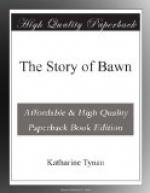I thought him the very finest gentleman I had ever seen or ever hoped to see, and that is to say a good deal, since it would not be easy to find a finer gentleman than my grandfather. And I had the portrait of Uncle Luke and my childish memory of him. And Theobald is as fine and gallant a young gentleman as you would wish to see.
But this stranger was finer than any of them.
Suddenly he looked at me for the first time, and I saw his face change. Some wave of emotion passed over it, troubling its gay serenity. His lips trembled. And then he was himself again.
“Pardon me,” he said. “For the moment I thought I had seen a ghost—as though ghosts apparelled themselves like the rose! You are very like some one I once knew who is now dead. I am so glad I have been able to help your poor dog.”
I stammered like the rustic Richard Dawson had taken me for. Who could this finest of fine gentlemen be?
CHAPTER XI
THE FRIEND
He was tall and slim, and had an elegance of air which really does not seem to belong to our age. His face was bronzed and his eyes were of so dark a grey—I know since that they are grey—that I thought them black that evening in the shadow of the woods.
He had a little black moustache, and, in odd contrast to it and his look of youth, his hair was quite white. It was perhaps that which gave him his air of elegance. He was really like a powdered gallant of the last century rather than a gentleman of this. But his speech was of this, and very Irish as well.
“I am so glad I was able to assist you,” he said. “There, good dog, good dog!” to Dido, who was fawning upon him. “Let me see! She goes a little lame, but there is no harm done. She will be quite well in a day or two. And this shall do no further damage.”
I suppose it was no great thing, seeing that the trap was old and rusty, but it seemed to me a great feat of strength when his long fingers tore it apart and flung the two halves into the bushes.
“They are murderous things,” he said. “Every man who laid one should himself be caught in it.”
“I am grateful to you for ever,” I said. “What would I have done if you had not been at hand? I could not leave Dido. If I had she would have broken her leg in the effort to escape. And try as I would, I could not force the trap apart.”
“To be sure not,” he said, glancing at my hands; “and I’m very glad I came by. By the way, I was trespassing, I’m afraid. If Lord St. Leger or any of his family had come upon me I should have been ordered out of the woods.”
“Oh no,” I said, with some indignation. “That you would not have been. I am Bawn Devereux, Lord St. Leger’s granddaughter. We are not so churlish.”
He lifted his hat again.
“Lord St. Leger’s popularity is well known,” he said. “It has always been a friendly and generous race. Yet I think I should have been turned out of the woods.”




